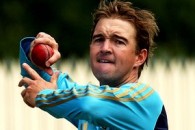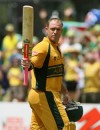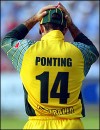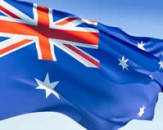Last night at about 6 pm I was sitting in my lounge room with my seven year old son. We were watching the lowlights of the 05 Ashes when he turned to me and asked “Dad, why do we hate England at sport so much?”
As you might imagine, this was a disturbing moment for a parent. Despite nurturing and loving both he and his twin sister since their birth, and trying to raise them as decent individuals free of nastiness and malevolence, the fact I’d let him reach seven without making so important a matter second-nature to him was like a hammer blow to my heart.
In 1974-75, my grandfather took me to my first Test match at the SCG. Readers will of course be aware this was the series when Dennis Lillee and Jeff Thomson took England apart. As a youngster, what struck me right away was the depth of feeling towards the visitors and the uncontained joy at the thumping they were being dealt.
By 1981 little had changed. That was Botham’s series, and such was the aggression and passion in the way he played, I overheard as an 11 year-old the ultimate compliment paid to him by my uncle – “He should have been Australian”. Yet even this affection towards an Englishman was tempered by the comment which followed, as the players left the field for a rain interruption – “That’ll be the only shower the Poms have in a while”. Revenge came in the Centenary series in 82-83, when Greg Chappell led Australia to victory, though not before an epic Melbourne Test in which Border and Thomson nearly stole the match from England. Thommo’s take on the loss – “It’s bad enough to lose at the best of times, but to lose to that pack of sheilas was a disgrace”, indicated that feelings still ran deep.
In the mid-80s, things were grim for Australia, as England romped to victory in the 85 and 86-87 series. You know you’re travelling badly when Richard Ellison rolls your batting line up in a Test match, but the nadir was Melbourne in 1986 when Australia capitulated by an innings inside three days to the might of Gladstone Small, John Emburey and Phil Edmonds. Something needed to be done. Allan Border, captain in those series’ and the very embodiment of conviviality, needed to harden up and take a more traditional approach to cricket against the Old Enemy, rather than sit in the Poms’ dressing room and have a chat with the opposition.
David Gower, England’s captain during 1989 and a friend of Border, noted all he got out of his counterpart before the series was decided was a monosyllabic grunt. Frankly, it was worth it. 1989 came to symbolise vindication of all that is good in the world. Border’s men, called the worst side to ever tour England, thrashed their old rivals 4-0 and set in motion the rightful order of things, which stayed in place until the scandalous events of 2005.
That series, lauded as one of the finest ever played by many purists, was easily the low point of my sporting existence. Looking back, the worst part was feeling so helpless, sitting on the other side of the world in the middle of the night. Unlike home series, where one can get to a game and feel part of it, the 05 hiccup (let’s not call it a loss, OK?) was akin to watching footage of a natural disaster from overseas. No matter how often one roared disapproval at the incompetent umpiring; at England’s devious use of substitute fielders so the bowlers could get a rest and riding instructions after each exhausting six over spell, or at a bad shot played by one of your own, there was an overriding sense of despair at the utter futility of your protestations. Finally, I knew what it must be like to support England.
In January 2007 I was again at the SCG, this time in the Members’ Pavilion with my wife, on day five of the Test as Warne, McGrath and Langer retired. There was sadness in the crowd at “Time” being called on the greats, but generally the atmosphere was euphoric. It was, however, not euphoria built on serendipity or sudden excitement at the result. Rather, the overriding sense was that things were as they should be. Not once did I hear a single murmur of sympathy towards the Poms as they went under 5-0. I’d have been disappointed if I did.
So there it is, laid bare – a summary of my Ashes life. Of course, the rivalry goes back much, much further. From an Australian point of view, the depth of feeling might relate to the “little brother” syndrome – an abiding, burning desire to trounce the older (though obviously inferior) sibling. Personally, I see it as a rivalry fuelled by the sense of injustice at the litany of English atrocities which have taken place for more than 125 years.
Here’s just a sample. From Grace’s unsporting run out of Jones at the Oval in 1882 which ultimately led to the birth of the Ashes themselves; through Bodyline; Hammond batting on to 903 in 1938 in an effort to kill cricket as a spectacle; a tailor-made dustbowl for Jim Laker in 1956; John Snow striking Terry Jenner; the strange fungus (Fusarium) which allegedly struck the Headingly pitch in 1972 despite the rest of the playing surface being the greenest of green swards; Mike Brearley denying Dennis Lillee a decent earn by stopping the use of his revolutionary aluminium bat; the infliction of Chris Tavare on us in 1982-83 in another effort to kill the game for fans; right up to nefarious use of mints and appalling misuse of substitute fielders in 2005, England has given Australian supporters cause to keep the fires of cricketing rivalry burning. It’s fair to say we haven’t missed the chance.
By 11.30 last night, after I explained what it all means, my son finally got it. By that time he was pretty tired though. Don’t think he’ll be much good at school today.
Never mind. The week’s most important lesson had already been learned.






